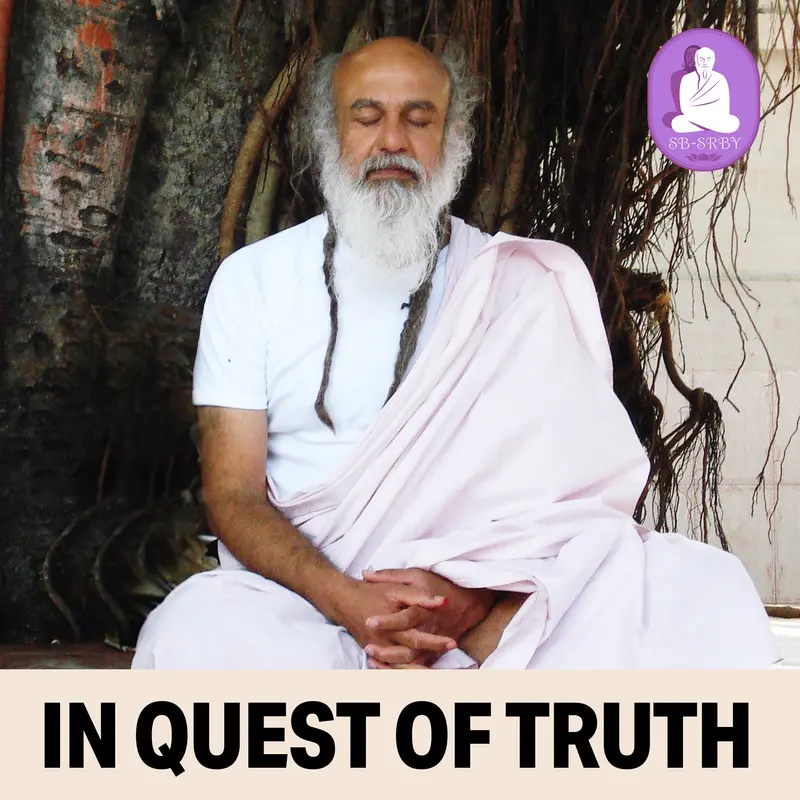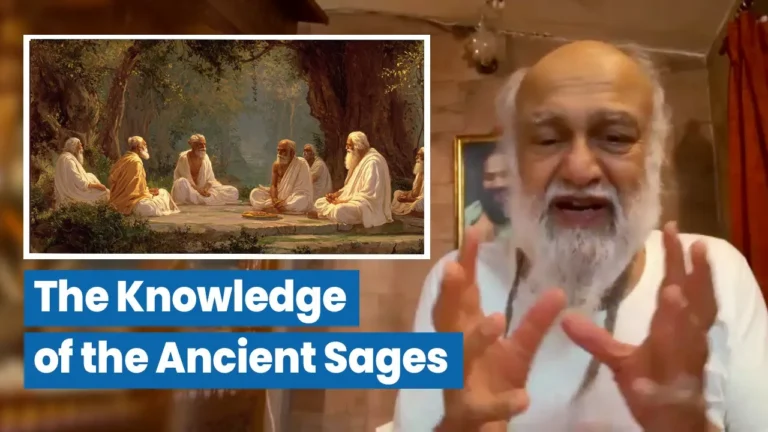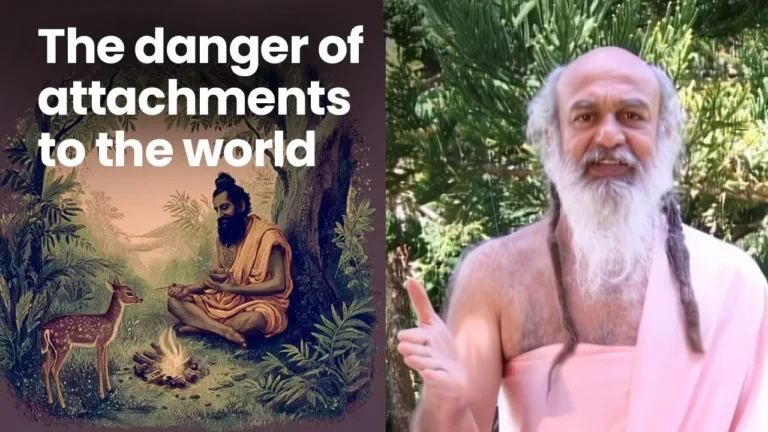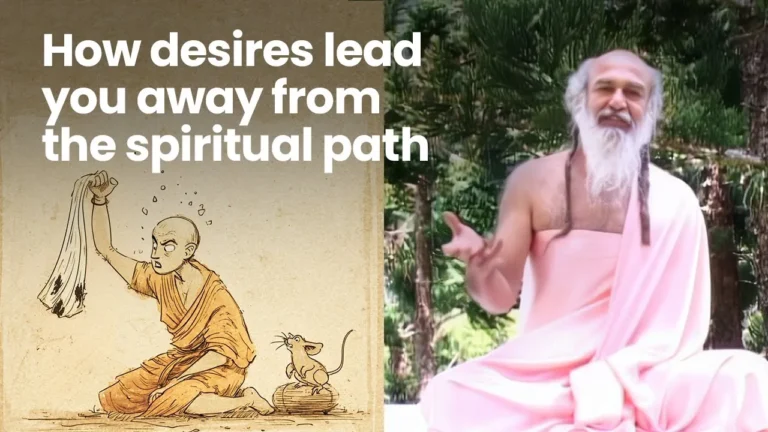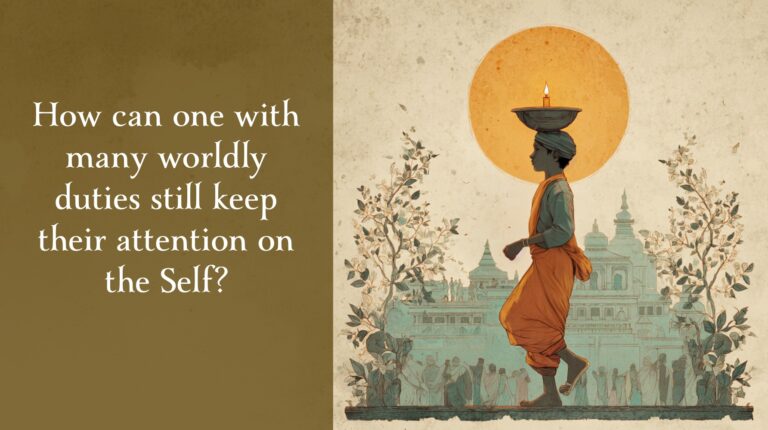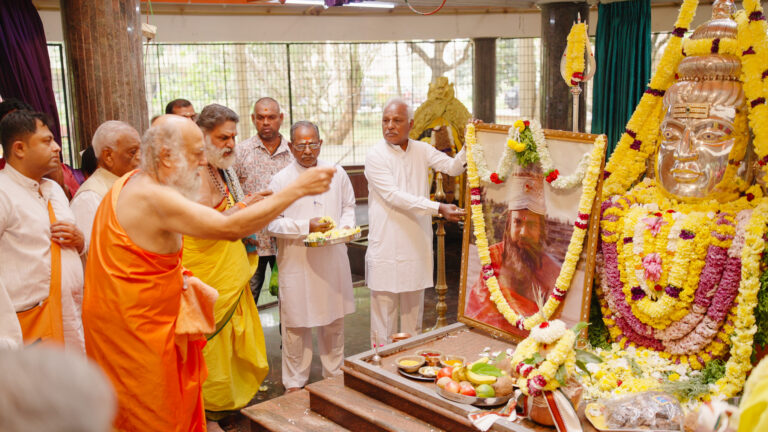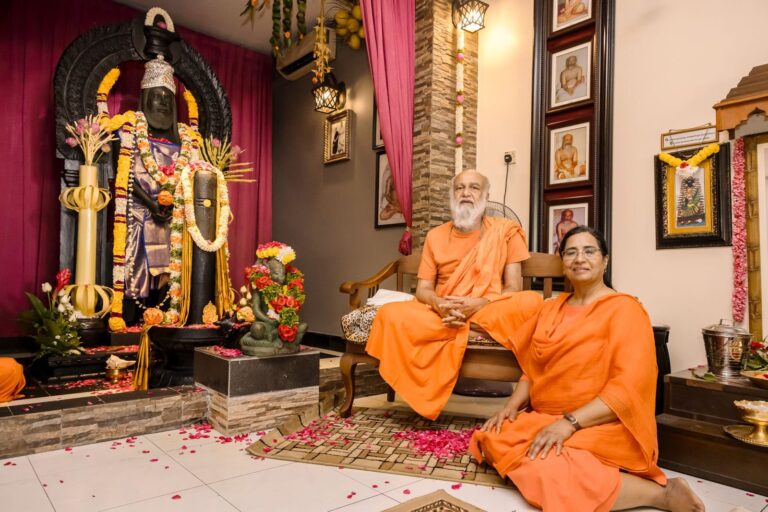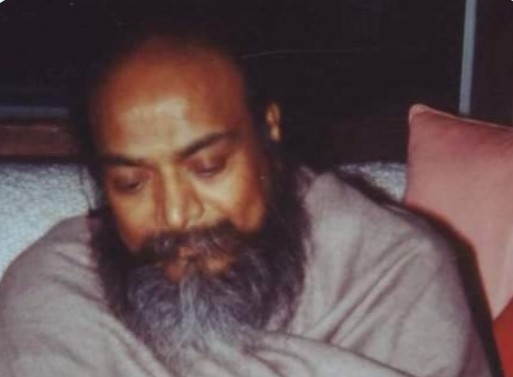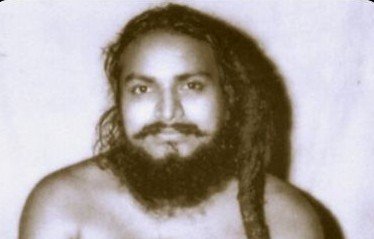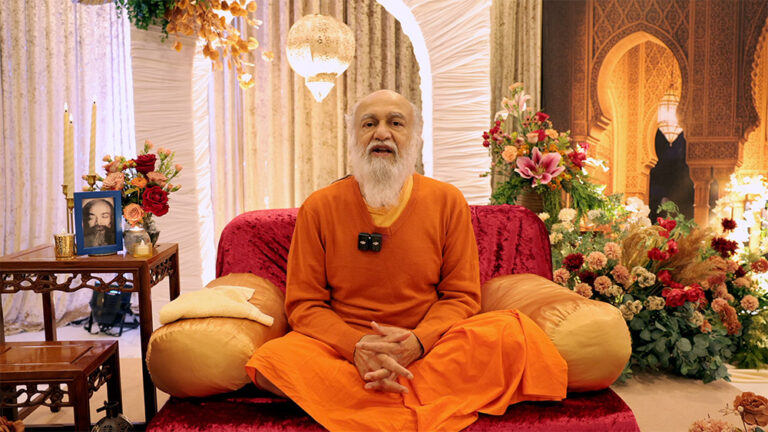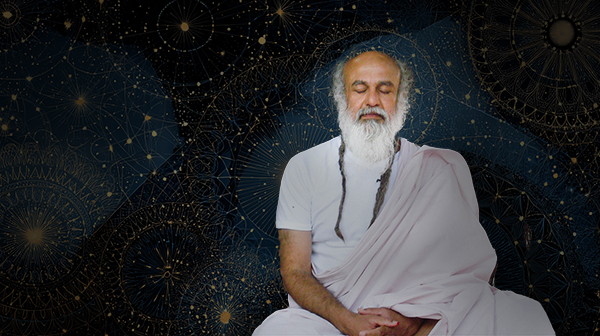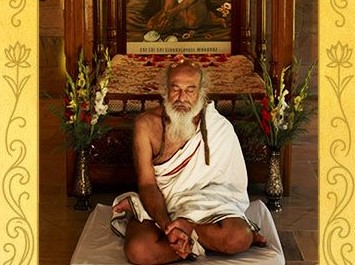A series of Q&As filmed at the Shivabalayogi Devarayasamudram Ashram in South India during a meditation retreat with Shri Babaji over the course of 10 days.
0:00 Intro
0:07 During meditation the mind is quiet, then automatically after one hour is over, there is some reaction
1:01 For a beginner, 15 minutes is a very long time to be meditating
2:00 Can Babaji give us a clue into what happened when Babaji lost the concepts of time and space on achieving Self Realization?
2:48 Can Babaji tell the difference in energy when there is a full moon?
3:20 Did Babaji have a calendar in the room during tapas?
3:37 Certain days are said to be auspicious days. For Babaji is it all the same?
5:03 Do directions also have no significance?
6:24 Is there positivity and negativity for a Yogi?
7:10 Is jyotish working on the level of the imagination?
9:31 Didn’t a Jyotish person look at Babaji’s birth information without them knowing who it was?
14:19 Do you see the Divine in different forms or do you see a uniform Divine?
14:56 So do you still see our forms as the Divinity?
16:23 How do you perceive us as Divine even though we are not Realized?
19:03 Do you perceive our ignorance?
19:31 Do you see animate and inanimate objects differently? Do you distinguish?
20:42 Is the Guru aware of the particular habits of each person?
21:42 Has there been any evolution in how people receive your teachings?
24:22 In the Bhagavad Gita, why did Krishna tell Arjuna to pick up the bows and arrows and shoot, the battle is already won?
25:44 What is the significance of Arjuna seeing a vision of the creation?
26:24 It says that other than Arjuna, Bhishma also had the vision?
27:12 During the war, why did Krishna employ certain tricks to enable Arjuna to win?
31:48 In Bhagavad Gita, why does it not mention the reason for starting the war?
41:44 What do you recommend for us when we go back to our everyday lives after the retreat?
44:06 What is a good imagination to visualize in order to see the Divinity in everything?
DSM Ashram Meditation Retreat 2024: Day 7, Evening Q&A with Babaji
Question: During meditation the mind is quiet, then automatically after one hour is over, there is some reaction.
Shri Babaji: That is the reason, like mantras they have fixed for 108 times. Each time you sit, a number has been given. The basic reason is mind takes that much of time to cool down and become focused and concentrated. If sincerely you do 108 times of the mantra, focused on the mantra, then your mind becomes concentrated. Same with meditation also. Swamiji was very firm—one hour meditation, even the first initiation anybody gave, that was for one hour. And He used to keep scolding if after 15, 20 minutes they would open the eyes, He used to, “Eh, Ssh! Close, close.” [laughs]
Question: For a beginner, 15 minutes is a very long time to be meditating.
Shri Babaji: The amount of habits that extroverted that mind wants to hit back, come out, so then it becomes difficult to keep the eyes closed also, until you get to use it. So, if you firmly sit from one hour then after some time the practice comes; one, the body also stills itself, then eyelids also stills, then you become used to it—one hour will be very comfortable once you are used to it. If you are not used to it, it will be uncomfortable; so that’s what happens, slowly, slowly. Then you at home also the same practice if you continue and once you feel so comfortable at one hour, you can increase another half an hour and you will feel better, so that will be helpful. Like that, slowly, slowly you can increase.
Question: Can Babaji give us a clue into what happened when Babaji lost the concepts of time and space on achieving Self-Realization?
Shri Babaji: When it is lost you don’t feel whether it is day or night or which day of the month; “Is it third of February or sixth of February or what?” Nothing comes to mind, time passing by also; only when Ambaji used to come she used to tell me. Otherwise whenever Swamiji’s appearance happened I used to understand “Today must be a full moon day”, so that’s how He used to appear. Other than that nothing comes to my mind. If I tell all the secrets then you should not take undue advantage of me. [laughs]
Question: Can Babaji tell the difference in energy when there is a full moon?
Shri Babaji: Now, for me, energy is all the same at all times. There is no difference; whether it is in no moon day or full moon day both are same. Because the divinity is there in all the things, they need not be that energetic, because the mind does not differentiate anything or discriminate, it simply sees the truth universally at all times.
Question: Did Babaji have a calendar in the room during tapas?
Shri Babaji: I didn’t keep the calendar, it didn’t occur to me—next time if I do I will remember. [laughs]. Good idea.
Question: Certain days are said to be auspicious days. For Babaji is it all the same?
Shri Babaji: Same everything, only for sake of respecting priests I accept, otherwise any day, Muhurtham is all right. Purandara Dasa’s song, “Sakala Graha Bala Neene Sarasijaaksha, Nikhila Rakshaka Neene”, the divine. It’s all man-made—if you start thinking, then you lose confidence; “Today the Muhurtham is not nice, you should not go—South India particularly these Rahukalam problems are terrible. Then they modify and manipulate to their convenience, Rahukalam also. So, just two minutes before you come out of the home and then after Rahukalam you can travel, no problem, nothing happens. Once they think nothing happens, nothing happens.
One time I remember, my mother was telling me, “Don’t travel on Tuesdays usually.” I was going to Chennai, my brother was there, elder brother, I had taken a ticket on Tuesday, but throughout I was praying, “God, please nothing should happen, otherwise, she will blame me, “Look, I told you not to come on Tuesday””, but nothing happened, I reached safely finally on Tuesday.
Question: Do directions also have no significance?
Shri Babaji: So, this concept, you see, we forget; though we get to listen, “God is omnipresent, omnipresent, omnipresent, omnipresent”, the same priest tells “East is good, West is bad”, like that, then we stick to the East and West, not the omnipresence of the divinity. It doesn’t exist in the mind, you see? If omnipresence of the divinity is there, what is south, what is north? Usually if a certain thing symbolizes a wrong or a bad omen, then do not do like that. Other terminologies also: you see, even today in India, for even people who live in the ashram also, many people address as ‘inmates’ of ashram, but in America it will be totally wrong. They address inmates of ashram only for the prisoners, the others it has to be recognized as residents. Then in my talk, if I tell “inmates of this house”, they will feel it a very bad omen type, like that. So that is what, it hits the mind, it is all the confidence and losing the confidence, so then you don’t feel like going further, that is what happens.
Question: Is there positivity and negativity for a Yogi?
Shri Babaji: So, when we make it positive and negative according to our imagination; “if a certain thing happens that is positive, otherwise negative”, otherwise there is no negative energy at all. If we see only God in everybody, nobody is negative. For a yogi, no negativity can come from anybody also. Even a worst crooked fellow comes also, we will see only God in that. So you have to rise to that level, but if you are in the imagination of positive, negativity, it all appears to be so. So, it depends on your imagination and assumptions.
Question: Is Jyotish working on the level of the imagination?
Shri Babaji: Jyotish can be helpful psychologically, with due respects to those people who practice in that one. Most of the time they guess a longer thing, “This year is going to be more calamities, more troublesome things, more conflicts”, so everybody can understand—you also can tell a Jyotish sitting: “Wars are going to happen, more floods might happen, this might happen”, 20 things you tell, at least 2 or 3 truths happen, true things do happen. So that is what it is actually. On the other side, from the other point of view, historically only you take—so many things have happened, floods, tsunamis, assassinations, etcetera, etcetera, nobody has been pointedly told, “At 7.45 am, this person is going to be killed”, but once that happens, everybody starts claiming, “I had an inclination, I had hinted”.
Now the Nostradamus things keep happening. How much he would have predicted about the world or universe? He has gone, so his language is manipulated and exploited and changed, edited, re-edited, “He had told about Hitler also, he had spoken about Iraq and Iran” and anything that happens, “Oh, he had already told”. Where was that one? “So now you tell what is going to happen next year”, “That is not told yet”, because next year has to come. When it happens, “Oh, Nostradamus had told already”. On and off this keeps coming, people keep playing, it is like the video game type, this keeps happening. But coincidences really don’t happen. In spirituality, it teaches you to face the moment, it doesn’t talk about the future. Even Shri Krishna tells Arjuna, “Nobody knows what the result of this war is, but it is your duty to do the karma, you take up the weapons and fight if it has been imposed on you, and then you make it that you can win. You should have that enthusiasm while doing, so that is what He says in Bhagavad Gita.
Question: Didn’t a Jyotish person look at Babaji’s birth information without them knowing who it was?
Shri Babaji: Yes, a couple of times my horoscope has been said, but that I am a yogi or what I am, they couldn’t tell exactly. It was a well-reputed person—they were asking for certain hints and certain questions; that is not the thing. Pinpointedly you must be able to tell. General guesswork, all of you can be experts; when you see the life, a longer vision you can always have. Another thing, many people might believe, many of you also believe the Vastu thing also. It’s a nexus between contractors and these Vastu people. He will come and see, “This construction is not right, proper, the kitchen should not be here and the bathroom should not be here, you break the bathroom and you construct the bathroom here and put the kitchen here”. And you call the contractor and the mason, everybody gets benefited. So, they will create havoc. When you believe, they will create doubts in your mind.
See, life is a mixture; troubles come, happiness comes, unhappiness comes. In spite of the fact that you listen to the Vastu and construct everything according to the Vastu, there is no guarantee that universally you will always have happiness in this world. This is the truth of philosophy. That is what Swamiji used to tell, great sages like Vashista, they all calculated and gave the ripe moment, Muhurtham for crowning of Rama as the crown prince, but at the same moment he was banished to go to forest. What the moment has to do in these things? So, that is what Swamiji used to tell.
Means, this is the thing; one particular weakness about our human beings, we don’t want trouble any moment of our life, we are scared. We don’t want any such thing; all the time it should be smooth, comfortable, happiness. How can that happen in this world? It doesn’t happen. Just to satisfy our mind, we keep doing any one of the things—hundreds of things are there. Somebody gives according to your rashi (vedic zodiac sign) some ring and some stone in that color of stone, once you wear it, you feel confident, “Now I am wearing, everything will be all right, aah”. So, mentally it is mental satisfaction, that is what is needed, mental confidence. If at all it comes let it come, what to do? We cannot help it, anything, any illness happens. When we sat at Perth in the aircraft, we did not know what was going to happen when we landed in Melbourne. When we landed, I got the double image in the eyes suddenly—nobody had predicted, nobody could tell anything. When Apollo 13 could not land on the moon, everybody said in America that number 13 is a very bad omen—that’s it, so funny.
So, this makes sense, for that purpose if they had constructed for a sunlight and the other reasons, astronomical reasons if it was done is a different thing. But now in the modern times it has changed its course, common people are being exploited, so they are afraid, “Oh, you should not do this one, you should not be doing this one, you should not be doing this one, altar should not be here, they should not be here, the fan should not be here, it has to come here”, then it will require some more wire, now we have to buy some more wire, so the shopkeeper benefits…
We read a lot of stories, that story of Mulla Nasruddin also is there. So, once the laundry man was coming with his cloth, and the King was also coming. So, on seeing the laundry man, the King sneezes and he falls down off the horse, so then he orders that the laundry man to be put to death, “Because on seeing him I had to sneeze and I had to fall down off the horse”. Then laundry man’s last wishes are asked. He tells “I want the King also to be put to death.” “Why?” “Just by seeing me, he fell down off the horse, but by seeing the King I am losing my life. How bad this King’s face is!” [laughs] So, it is the wittiness, wisdom, use of wisdom. We are always selfish, on one side is justice, and the other.
Question: Do you see the Divine in different forms or do you see a uniform Divine?
Shri Babaji: One uniform stillness of divinity is what the thing is. The rest anything happens, it’s like a drama enacted, nothing serious, nothing to be worried. But that is not as easy as we talk, it has to come through long time tapas, the mental imaginations must burn out, everything, then only that thing comes. So that’s how the thing happens.
Question: So, do you still see our forms as the Divinity?
Shri Babaji: I see the divinity and I realize fully that it is the divinity, but yet I also understand a drama is there. Like Ramakrishna Paramahansa used to tell the story, when the master was teaching the Advaita, the student misunderstood. By theory, it’s very difficult to follow the Advaita, not easy, so he thought “God is everywhere, my master sees God in everything”, so he was sitting on the banks of river and the elephant was coming. The elephant rider was asking “Give way, give way”. He thought “In elephant also there is Narayanan, God is there, I should not be worried, so God should not be harming me”, that’s what his perception was. But elephant came and it threw him away, he got bruised and fractured. He came to the master and complained, “You told God is everywhere”, so the master scolded. “God was in the elephant rider also, idiot! He was asking you to give way, but you failed to see God there.”
So, when you practice to see God, means in everything. Sometimes somebody might criticise me, somebody might praise me, so in all I have to see God and maintain my mental equilibrium; that comes by practice.
Question: How do you perceive us as Divine even though we are not Realized?
Shri Babaji: The inner source is the divine, but the outer form of the droplet is a bit confused, so that is all. So, with compassion… that’s why, if only there also this awareness comes, all conflict, all confusion, all unhappiness, everything ends in the world. So, we try to work it out, we try to create awareness. That’s why we encourage sadhana, practice, practice, practice. Generally as a teacher we try to avoid talking of the Advaita, because that could be confusing for many people, not by theory it will not come. By practice only it can happen, only when you yourself realise, that will come. So before that I must encourage you to do sadhana, meditation, meditate.
Just now don’t worry, slowly, slowly it will come, like that. So don’t try to practice just by looking into the book. So if you keep the book and then try to cook the things, you are likely to spoil the whole show if you are not practiced. So, practical experience is very much necessary for these things. I will behave with you, considering you as a Trass only, not as divine, then that will be difficult, dangerous, if I try to behave with you considering you as a divine. You are playing as Trass, I will also accept you as Trass, but inside me I know it is the divine. So, actually, because for your question only I’m answering for your understanding, so when you prostrate also there is no excitement in me that I have become something special and you are prostrating to me, that imagination doesn’t occur at all. One time I told in the beginning of my travel, our host brought a lot of edible items there. One other person who was travelling with me said “How nice it is to become yogi”. I told, “If you are interested to eat, don’t become a yogi, because the moment you become a yogi, you will lose interest to eat all these things even if it comes in front of you, you won’t be eating so much.” So, like that, visualizing.
Question: Do you perceive our ignorance?
Shri Babaji: A little bit, compassionately, with a better understanding. With the other human beings, when you depict any wrong or negative thing they may be upset or feel bad about it. But inside I don’t feel bad, I know, “You are helpless, simply”, that type of thing.
Question: Do you see animate and inanimate objects differently? Do you distinguish?
Shri Babaji: Everywhere it is, the divine is there, so that is what Kabir Das is telling; ‘Saadho ye murdon ka gaon’— ‘This world is a village of dead bodies’, nobody is alive, actually. Simply robots are moving around. Otherwise also if you observe human beings, you will feel that they seem to be helpless whatever they are doing. A hundred times 25 people will sit in front of me and listen to my answers, my teachings, everything, but when they go home and they behave, when they take up a cell phone and when they talk, they end up behaving what they are habitual to. You observe, you do a survey for people.
So, that’s a very difficult thing. So, that’s we tell there is no conscious… consciously people are unable to do it, they seem to be unconscious of what they are doing. This is what, you know, Jesus said, “They know not what they are doing.”
Question: Is the Guru aware of the particular habits of each person?
Shri Babaji: Just like the doctor knows different patients, different illnesses if he is an expert, if he has seen, if he had handled a lot of cases, so many cases, he is an old doctor, then he will know. So like that we learn as we go on watching different students. This is one group of students who have come to retreat, now I’m watching all of you for six, seven days quietly, whose nature is what, who is what and how you behave, how you just escape, how you try to do this, how do you try not to do this, these things we keep observing. Another group might come in the next year, I have to learn again, so it is a learning everyday as far as this world is concerned, new-new cases keep coming. But maybe better than another person, I know a little more, better about human psychology, human nature.
Question: Has there been any evolution in how people receive your teachings?
Shri Babaji: Much better people are able to appreciate from the West. Slowly, slowly in India also, a section of people are able to understand and appreciate the teaching, better evolution is there as they keep listening to me repeatedly, repeatedly. To some people it takes time, like for some cloths if it is too dirty, it takes a lot of soap powder to wash it, to some a little bit of powder is enough, it can be washed well, so it depends. But it is happening definitely. Everybody is troubled with conflicts and all these things, but they are confused, they don’t know what it is. Most of them are in a rush, want it happen instantly like instant coffee; things don’t happen like that one. But people generally don’t want to put in efforts, they want some power, universal power to put their hand and set right everything.
Things do not happen—a Mahabharata war had to happen; everybody accused Krishna, “If you wanted you could have stopped the war.” When nobody was listening to him, how could he have stopped the war? That is the fact actually, fact that was in front. Everybody, even Gandhari cursed Krishna, “If you wanted you could have stopped the war.” “Your son was not listening to me, how could I have stopped the war? In spite of that, if you want to curse, okay, if that is the prarabdha, let it happen like that.” He accepted the nature, we have to leave it to the nature. So, that’s how things happen, we have to put in effort, we have to watch people, everyone. Evolution is happening, but dramatic results cannot be expected, this is the truth actually. Many people talk, “Oh, now everybody is spiritual, world is going to change”. Twenty years, thirty years, seventy years we have been watching, the world does not change like that overnight. It’s going to the worst human thinking, it’s becoming more violent, more selfish. The reason is, with the advent and advancement of science and technology we are forgetting spirituality. So, the things that we have discovered and invented, they are creating more conflicts, more and more conflicts, you see? Wealth creates conflicts—when there was no wealth it was more peaceful, that type of thing many people would have experienced.
Question: In the Bhagavad Gita, why did Krishna tell Arjuna to pick up the bows and arrows and shoot, the battle is already won?
Shri Babaji: It was a psychological push. He was so depressed and always the relatives; he could not see that those people whom he considered as his grand sire or relatives, they all had sided with wickedness, adharma. That is the reason they had to face the war, otherwise the war wouldn’t have happened, but Arjuna was depressed. “I cannot fight, I am going to kill. Even if I kill all these people, what is the use of we getting the kingdom?” So Krishna was trying to tell him, “This fight, it is not for your sake that you have to kill, it is not that you need some property. For sake of the society’s protection, for society, citizens of this country, entire sub-continent that it has to happen; for their sake you have to take up the bows and arrows. Finally when Arjuna was not listening, he had to employ the psychological things like, “I have already killed these people, you just take up bows and arrows and shoot the arrows.” So, it is like that only.
Question: What is the significance of Arjuna seeing a vision of the creation?
Shri Babaji: See, they say, when He went on explaining psychologically, philosophically to Arjuna, Arjuna’s mind was engulfed with the teachings; within his mind it manifested, he saw that vision as a mental projection or manifestation, that’s how he saw it. So, Krishna only went on explaining, “I am this and I am that…”, so that’s what was happening, and Arjuna got to see that one. So, that is it.
Question: It says that other than Arjuna, Bhishma also had the vision?
Shri Babaji: Bhisma knew that Krishna was a great Self-Realized soul, he knew. That is why when he was listening, attentively he was listening to Shri Kṛishna’s advice to Arjuna, he also got that vision, blessed with that one. Not everybody got that vision, because others were not concentrated, they were not interested to listen. Whoever was listening, for them, they understood that philosophical truth of what Krishna was teaching. ‘I’ means Krishna was not mentioning that ‘I’ of the body, that ‘I’ as the Ultimate Self, Ultimate Truth He was explaining, that Truth.
Question: During the war, why did Krishna employ certain tricks to enable Arjuna to win?
Shri Babaji: Arjuna was habitual—see, this is what happens. To be precise, a practical lesson I will tell all of you. All of you definitely respect me; when I am talking here you will all listen, but when you go back home, you will all behave according to your habits. So, that was what was happening in Mahabharata war. In spite of after listening to Bhagavad-Gita, Kṛishna said, “Arjuna, I know you will behave according to your nature.” Like when Abhimanyu got killed, he instantly took an oath that “Tomorrow before sunset I will kill Jayadratha. If I cannot kill, I will enter fire.” So, next day before sunset, Arjuna’s concentration was getting disturbed, he was unable to fully concentrate on the fight, on shooting the arrows. Half of his concentration was going on the sun, whether the time is passing by, passing by, a sunset is going to happen. That is when Shri Krishna ridicules Arjuna. “Arjuna, you all Kshatriyas have this illness of taking oaths unnecessarily. What was the need to announce on the microphone, you should have simply taken a bow and arrow and killed Jayadratha. This is war, there is no need that you had to announce that “I am going to kill.” You kill and everybody will understand that you had to kill. Now you see, they are alerted, enemy forces are totally alerted, they want to protect Jayadratha at any cost, so that they can make Arjuna enter the fire—Arjuna ends his life, then Pandavas will become so weak. Such a situation, Arjuna, because of your foolishness you have created.”
And when he was fighting Dronacharya also, Dronacharya stood in the front and it was not possible to defeat Dronacharya. Krishna tells, “This old man knows no fatigue.” They were all in their nineties or so, Dronacharya, but they were such great warriors. Arjuna was no match Dronacharya when he stood like that one. Then Kṛishna tells, “You do a pranam and I will circumvent Dronacharya in our chariot, then we will go.” Then Dronacharya understands, he also allows them to go. Such things Krishna had to employ. Without Kṛishna, they couldn’t have won because understanding a Dharma, executing the Dharma is a very difficult thing. As everybody was talking of the Dharma as three types, three responsibilities; taking care of the physical body you all can understand, yoga, exercises, everything. And taking care of the mind’s health also you can understand, you meditate, you purify your mind. But the third one, upholding moral values is the most trickiest thing, because human beings are very cunning and clever. For them they keep one set of justice, for others they will keep another set of justice. “My children are different, your children are different” when it comes to blood relation and such things. This is human nature, everywhere it happens.
So, that was what was happening, that is what Dhritarashtra was doing, because it was his son. Draupadi was not his daughter, Draupadi was his daughter-in-law, Pandavas wife, so he kept quiet. Conveniently he kept quiet, didn’t order, “No, this should not happen.” Nobody protested, “This is not fair play, this is injustice.” They didn’t use their wisdom, “There is no such contract that you can do anything with the woman, you have no right to disrobe her, this must be stopped.” Nobody was ready, everybody defined the Dharma according to their convenience, so that’s what happens. That was what Shri Krishna was handling, so He had to employ such things.
Many Indians also misunderstand Krishna also, today also they have spoken to me. “Shri Krishna was only a politician, Babaji, isn’t it true?” “No, no, you have not understood” I have told him. Shri Krishna, one of the greatest assets of our country, our world. His wisdom of application, teaching the Dharma, what is fair play, how to set a priority, what is the Nyaya. So, this is what happens. We all face in our lives people behaving according to their selfishness and narrow-mindedness.
Question: In Bhagavad Gita, why does it not mention the reason for starting the war?
Shri Babaji: Shri Krishna simply went on advising Arjuna, “You have to fight this war”—for that He spoke about the Dharma. The reason why this war had to happen means, He went on telling, they were unjust, Duryodhana was unjust, otherwise this war wouldn’t have happened. So, all chances were given, all avenues were explored to avoid the war, but when one person insisted unjustifiably then the conflict happens. Just for our sake of understanding, education, from childhood itself when they used to behave, Pandavas were innocent; they used to behave like childish people. Bhima, he was powerful, but not with the wicked things. Whereas Duryodhana always planned wicked things in a cunning way, planned-murder type of things. In the court of justice, whether a person was defending, whether in the spur of the moment it happened, whether this is a planned murder, like that, they decide what is justice, what is the punishment that has to be given. That type of thing was happening.
So, whenever Shri Krishna came also, He used to alert Dhritarashtra or Gandhari, “Look after your children, what they are behaving is not nice. Because they are very young, now you all don’t understand, it is not coming. One day when they grow up, if they take up weapons and are ready to kill each other, they won’t listen to any philosophy, any advice of anybody, then all elders will be affected.” But Dhritarashtra was not listening, he went on overlooking whatever his son did. So many things has happened in Mahabharata story; he wanted to kill Pandavas, putting fire to where they were staying, this type of thing, finally he planned the dice game. So, in the dice game, he cheated with the help of Shakuni and went on making temptations to Yudhisthira.
So, conflict happens from both hands. Yudhisthira also got tempted. Without applying wisdom, without consulting their Guru, he went on doing it out of personal ego. So, these types of things happened, that is how the conflicts come, otherwise such things wouldn’t have happened. See, they all loved Krishna, they knew Krishna is a Self-Realized Soul, a great Guru, but in the Kshatriya clan, in those days in society it was a matter of prestige. If the opponent invites you for a game of dice, you could not refuse, you had to accept the challenge. If you refuse to play, that means you are a useless person, it will be below dignity, that type of thing was there. But Yudhisthira could have told, “I will accept this dice game only after consulting my Guru Krishna”, then this thing wouldn’t have happened.
Well, he didn’t consult, he came and sat, and certain rules were set, but they overruled all the things, the opponents. “You put into stake, you put this into stake.” A king has no right to put the entire kingdom at stake, because kingdom doesn’t belong to the king, it is for the citizens; he is just supposed to take care of the things. But he put the kingdom into stake, “Now this will be yours”, they won the thing. Afterwards when they were tempted, he went on putting his brothers also, that was another mistake Yudhisthira also did. So, they were already wicked and here foolishness was happening, that is how the calamities happened. One side was wickedness, another side was foolishness. So Yudhisthira went on putting. Finally he put his wife also at stake. See the temptation and this is what are the lessons, moral lessons that is given for any person—such games must be avoided, lottery type of games or this type of dice games out of money, putting stake of the things. So, they went to the extent of putting his own self and his own wife, everything happened. They won the things.
Before that when Yudhisthira had built a palatial bungalow with the help of a Maya, Shilpi sculptor, so in those days still a mirror, that type of thing were all miraculous things. So, many things he had built like that way; a certain water flow appeared, but actually there was no water, where it did not appear to be water, there was water. So, Duryodhana falls into the water, does not know. From a distance Draupadi was watching, Draupadi laughs at him. And the story says, because Duryodhana’s father was blind, “A blind son is also blind”, she uttered. Well, that is a wrong thing, we all accept, but that does not mean that you can do anything with that woman. If she had uttered a wrong thing, he could have complained to the elders, “Draupadi uttered like this”, so the elders could have called her and scolded her.
So then the matter should have ended, if necessary her husband should have scolded. But Duryodhana kept the grudge in his mind in a wicked way: “Any moment comes, I will teach her a lesson, I will disrobe her, I will put her into such embarrassing… below the dignity of that thing.” So, here everybody behaved in such a way; wicked people and his friends, everybody sided with him. And the other side, nobody thought, at least we should tell, even her husband could have protested—today if we try to apply wisdom and think—he could have protested, “Okay you have won my wife, you can make her a slave, she can mop your home, wash the utensils, any such thing is ok, but you cannot disrobe her, she is an woman first, she is my wife afterwards, as an woman I will protect”, Yudhisthira could have told, but they all kept quiet, silently, they didn’t say anything.
So that’s when the story is telling that Shri Krishna taught to set priority, He did not see anything else. When Draupadi remembered Him, He came and protected Draupadi from getting disrobed. So, that was wrong; everybody were in the court—if at all it had happened, we do not know whether it happened or not, we try to discuss if it had happened—her own five husbands were there, grand sire was there, Bhisma, a great saintly person, supposed to be, but he also kept quiet. He did not protest and he felt helpless, because he said, “My loyalty is to the king, without his orders, I am sorry, daughter, I cannot help you.” But he also forgot, “If I help this woman, I could save the entire Kuru clan”—he knew that one. Because of this a war can happen, there will be vengeance with each other wanting to take all such things to show their vengeance, he knew that one, but he forgot his dharma is to protect that woman first.
That is how conflicts happen in this world also. Countries fighting war, if you try to go to the root cause of why these two countries are fighting, then you will understand, but it’s very difficult to establish, nobody will accept. Countries siding with one side, another side, they will all justify their actions to suit their interests; nobody will accept why this has to happen. So that is how this world, humanity is going towards destructive things, destruction, because that is what is known as selfishness and narrow mindedness. That’s why the war happened. That’s when Shri Krishna taught—in spite of that also they avoided, Shri Krishna came to Kauravas as a peace worker. He told, “You don’t have to give their kingdom, just give five villages to five brothers, they want to live independently with self-respect, then the war can be avoided”. But Duryodhana was not giving, “I won’t give back.”
After that the condition was “I will take your kingdom and you will go for 12 years of forest living and one year of incognito living.” After coming back their kingdom should have been given back to them. So they successfully stayed in the forest for 12 years and incognito for one year, when they came and claimed “Now the kingdom is ours”, Duryodhana refused, “You fight, we will see in the battlefield only. There if you win, you take, otherwise we will take, it’s ours, I won’t give.” So that’s how the war became inevitable, finally.
Bhagavad Gita does not teach violence. Some years ago I heard that Russia has banned Bhagavad Gita because it teaches violence and war, but it is not so, it teaches peace and Self-Realization. But if somebody has imposed the war, what do you do? You have to defend yourself.
Question: What do you recommend for us when we go back to our everyday lives after the retreat?
Shri Babaji: Try to remember the teachings you received while you were here. That’s what says how seriously you were listening to me, listening to my answers and the morals, what I was trying to convey, how that could penetrate. At least we used to wait for Swamiji to come to Dehradun every year, I didn’t talk anything what I wanted to Him. Whereas many others used to come with their problems, “I want this to happen, I want this to happen”, so Swamiji simply ended up telling that one. They never thought what was it that Swamiji wanted to convey, wanted to give them, so they never knew what Swamiji wanted. Whereas I was waiting. He used to be sitting, suddenly He used to utter if it came to His mind; if I asked anything then He used to tell, that’s how I could learn. Even today it is ringing, my ears, every word that He said about faith, about devotion, about moral values, about this thing, how to be careful.
Like the stick she was talking in the afternoon, that stick He gave. “In the dark if you go out for any reason, take one stick and a torch always. Even if an animal comes, at least you can fight out; even if you have to lose also, you can fight”, that’s how He used to talk. Without resistance you must not give up things, without fight you must not give it easily, like that He taught these things. So these things, if you also listen like these ten days, it’s quite a long time, so then you won’t forget, you will all remember what I have answered for the questions, what I have tried to teach you all. So you keep that practice always in the midst of your way of life that you would have adopted. Every day you get up in the morning, one hour of meditation practice and chant the mantra that I have taught you in the morning. That script also is there, you can note down in your phone or anywhere and try to chant them and try to listen to devotional music. These things can be very good therapy to keep your mental energies channelized on the positive side.
Question: What is a good imagination to visualize in order to see the Divinity in everything?
Shri Babaji: I would suggest if you meditate it will come practically. If you try to visualize, it could be confusing. If somebody slaps you one side, you should not show the other side of the cheek, slap that person back, then only you can defend yourself—you need to make the hissing noise. So, these type of stories are also said by gurus in ancient times, we have read in books also. So, there was a guru going through the village and one person wanted to listen to the his teachings of the master, and the snake was also there, snake wanted some advice. He said “Don’t bite, don’t harm anybody, try to be noble and try to meditate”, he taught the snake also. Then after some years again the master came that way, so then the snake comes and complains. “Master, I just followed your instructions, I did not bite anyone, I kept quiet, but this is what has happened, everybody started pelting stones at me, I am almost getting killed, I am bruised all over my body, so what is the use of the philosophy that you taught?” Then the master said, “Did I say not to do hissing also? Do some hissing and keep the people at a distance, you don’t have to bite them, but you have to show them hissing, otherwise everybody will take you granted and sit on your head.”
So, this is what needs to be followed and understood. When you try to see divine, at the same time you have to be careful. If it is a tiger, Narayana; that is how Ramakrishna used to tell, you have to be careful with a tiger. If you come across a leopard, don’t think “This is God, simply it has to be divine”, not like that, you have to treat it like a leopard, because the brain is like that there, it’s brain is like that and it will end up behaving whatever it is used to. In the same way every human, they have their own brains. No matter you consider them divine, but they will end up behaving the way they have to be with you, so for that you have to be careful. So, inside you cultivate the habit, “This is divine” and you don’t have to curse in your mind anybody, but be ready to defend yourself—these two things are totally different, bodily actions, mental actions have to be separate. Mentally you maintain your actions so that you are close to the divine, but outside, bodily ready to behave in this world as the need arises.
End of Session

